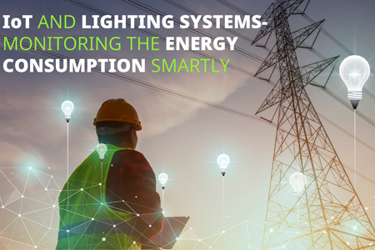IoT And Lighting Systems: Monitoring The Energy Consumption Smartly

When we talk about energy uses in our daily lives, it includes all the electrical appliances like television, heaters, air-conditioners, computer systems, cooking appliance, etc. Majority of the essential things around us consume energy for their efficient functioning.
In 2018, there was a 3.5% increase in the amount of US energy consumption figuratively approx. 2.3 Gtoe. These figures are a proof that there is an immense need for energy resources to run our lives. However, with the growing energy demands, it is a great challenge for us to conserve our resources for future generations. It requires efficient monitoring systems that help analyze the energy data for better decision-making.
For example, if there is an IoT-enabled energy monitoring system in your residential network, it helps in collecting the energy consumption data. This data comprises of different areas where the energy is consumed in various households and therefore, makes it easy for the people to minimize the energy consumption when appropriate.
Consuming energy for different needs is necessary but it is a necessity to be able to monitor the energy usage accurately. With the help of an IoT-based energy monitoring solution, it is very easy to monitor the energy used in real-time. Inclusive of advanced analytics and machine learning, this solution is a beneficial platform with its main target of reducing excess energy consumption.
Transforming Traditional Lighting Systems with IoT
The Internet of Things is significantly adding value to the traditional lighting systems that we use daily. As a technological approach transforms everything into an advanced system, IoT is introducing software-based lighting controls that add flexibility and personalization to your existing lighting systems. It is one of the great evolutions that a sensor-based lighting system exists and works with the presence and movements of a human body. This transformation is ultimately leading towards a better hold of energy utilization and data transparency for improved analysis and decision-making.
IoT promotes connectivity among the assets and a connected lighting system is a requisite in today's world. Wireless connectivity systems such as smartphones have made it easier to operate home appliances in just one touch. It has significantly reduced excess energy utilization and increased energy conservation.
For instance, if all your appliances are wirelessly connected through IoT, it offers flexibility and cost-effectiveness along with remote operability. Also, an IoT-enabled smart lighting system substantially requires less infrastructure and labour for installation, which makes it easier for you to manage. Using a smart IoT-enabled energy infrastructure you can save excess light bills and get a transparent record of energy consumed by each of your appliances.
Not only in residential areas, but a smart energy lighting system also works well for the hospitality industry which mainly targets a personalized guest experience. Even in huge industries, a connected lighting system would effectively increase productivity and reduce energy wastage.
Why you should adopt Smart Lighting Systems?
The Internet of Things uses sensor devices to collect the data through connected assets and this data helps in analyzing multiple situations where energy is consumed, helping in effective energy conservation.
- To Increase Savings
As per IBM, day-to-day building operations cover 70% of the total cost including its maintenance and energy consumption. IoT is bringing automation to most of our surroundings and is especially helping in making long-term benefits and energy savings. This would automatically save you a huge amount of money. Also, using an IoT-enabled system for your home would be a part of daily routine and will significantly decrease your carbon footprints.
- Energy Efficient
Smart Lighting Systems are specially designed to save excess energy consumption. In the US, both commercial and residential sectors used about 216 billion kilowatt-hours (kWh) of electricity for lighting. An IoT-enabled electricity system would help reduce the lighting costs involved in majority of the industries with its innovative solutions and real-time energy monitoring operations.
- Smart Cities
Deploying IoT-enabled lighting system helps in achieving enormous energy-saving goals, resulting in upliftment of smart city concepts. It provides improved service reliability, reduced operational costs, and a functional platform to implement effective applications for a better future. Conserving energy should be our foremost priority and a smart lighting system is the foundation to build an environment-friendly surrounding. Many electrical authorities are adopting IoT methods that work towards value-based outcomes at minimum costs.
The Internet of Things is a technology that focuses on the effective conservation of resources and energy saving is one of them. Implementing smart IoT techniques with the existing energy infrastructure is transforming the entire industry with cost-effective changes. This is resulting in big and positive decisions towards the environment, and motivating the professionals to work more towards the technological approaches of managing the energy sector. Urbanism has made us realize the importance of reckless consumption of our energy resources, but now is the time that we do our bit by implementing intelligent methods for long-term savings.
 Sanjeev Verma is the founder and CEO of Biz4Group, based out of Orlando, FL. He has conceptualized the idea of Biz4 Brand and founded Biz4Group and Biz4Intellia. He has 20+ years of experience in boosting IT-based startups to success. In the past, he has worked on leadership positions with Marriott Vacations, Disney, MasterCard, Statefarm, and Oracle. The company headed by him excels in developing, implementing, and monitoring digital solutions ranging from IoT solutions and products, mobile and web development, and digital marketing to full stack development and CMS solutions.
Sanjeev Verma is the founder and CEO of Biz4Group, based out of Orlando, FL. He has conceptualized the idea of Biz4 Brand and founded Biz4Group and Biz4Intellia. He has 20+ years of experience in boosting IT-based startups to success. In the past, he has worked on leadership positions with Marriott Vacations, Disney, MasterCard, Statefarm, and Oracle. The company headed by him excels in developing, implementing, and monitoring digital solutions ranging from IoT solutions and products, mobile and web development, and digital marketing to full stack development and CMS solutions.
